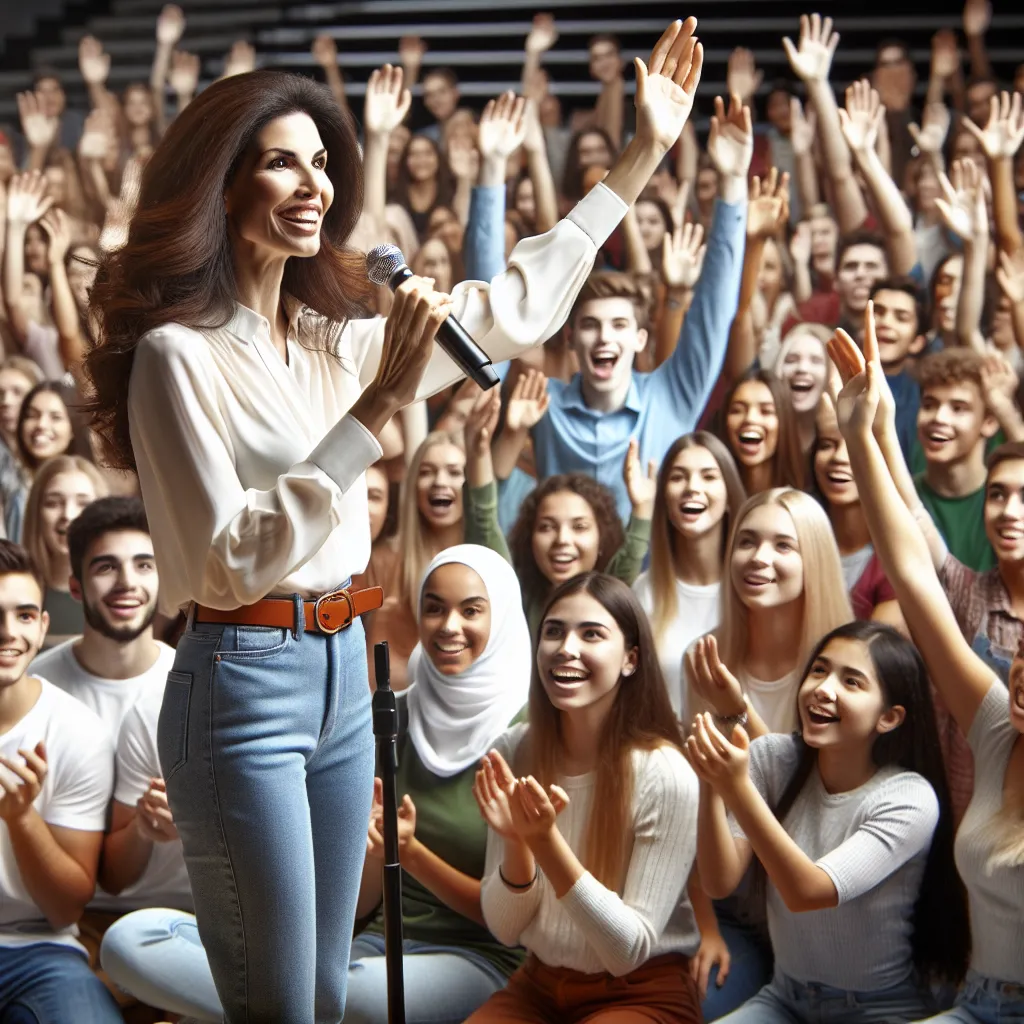As an IELTS Speaking examiner, I’ve observed that discussing role models is a common and engaging topic in the test. This article will guide you through answering questions about famous role models for young people, providing sample responses and key strategies to boost your IELTS Speaking score.
Nội dung bài viết
- Understanding the Topic
- Part 1: Introduction and Interview
- Q: Do you have any role models?
- Part 2: Long Turn (Cue Card)
- Sample Answer (Band 8-9)
- Examiner’s Follow-up Questions
- Part 3: Two-way Discussion
- Q: How has the concept of role models changed over time?
- Key Vocabulary and Phrases for High Scores
- Examiner’s Advice
Understanding the Topic
The ability to describe a famous person who serves as a role model for young people is crucial in IELTS Speaking. This topic allows you to showcase your vocabulary, fluency, and critical thinking skills while discussing influential figures in society.
 Inspiring Role Model
Inspiring Role Model
Part 1: Introduction and Interview
In this section, the examiner may ask general questions about role models. Here are some possible questions with sample answers:
Q: Do you have any role models?
Band 6-7 Answer:
“Yes, I do. One of my role models is my high school teacher. She was very dedicated and always encouraged us to pursue our dreams.”
Band 8-9 Answer:
“Absolutely. I’ve always been inspired by Marie Curie, the renowned physicist and chemist. Her groundbreaking work in radioactivity and her tenacity in overcoming gender barriers in science have been truly motivational for me.”
Part 2: Long Turn (Cue Card)
Here’s a sample cue card related to the topic:
Describe a famous person who is a role model for young people
You should say:
- Who this person is
- What they have achieved
- Why young people admire them
- And explain how this person inspires young people
Sample Answer (Band 8-9)
“I’d like to talk about Malala Yousafzai, a prominent Pakistani activist who has become an inspirational figure for young people worldwide.
Malala gained international recognition for her unwavering commitment to education, particularly for girls in her home country. At a young age, she defied the Taliban’s ban on girls’ education and courageously spoke out against their oppressive regime. Her bravery culminated in being awarded the Nobel Peace Prize at just 17, making her the youngest recipient ever.
Young people admire Malala for her extraordinary courage and her ability to turn a personal tragedy into a global movement. Despite facing a near-fatal attack, she persevered and continued her fight for education rights. Her resilience and determination in the face of adversity are truly awe-inspiring.
Malala inspires young people by demonstrating that age is not a barrier to making a significant impact. Her powerful advocacy for education has galvanized youth around the world to stand up for their rights and the rights of others. She embodies the idea that one voice can spark change, encouraging young people to be proactive in addressing social issues.
Moreover, Malala’s eloquence and poise in expressing her views have shown young people the importance of articulating their beliefs effectively. Her ability to command attention on global platforms has inspired many to develop their communication skills and use their voices for positive change.
In conclusion, Malala Yousafzai’s journey from a young activist to a global icon exemplifies the power of conviction and the impact one individual can have on the world. Her story continues to motivate and empower young people to pursue their dreams and stand up for what they believe in, regardless of the obstacles they may face.”
Examiner’s Follow-up Questions
-
Q: How do you think social media affects young people’s choice of role models?
Band 8-9 Answer: Social media has profoundly transformed the landscape of role models for young people. It has exponentially increased exposure to a diverse range of influential figures, from traditional celebrities to new-age influencers. This ubiquitous access allows youth to connect with role models who align more closely with their personal interests and values. However, it also poses challenges, as the curated nature of social media can create unrealistic expectations and promote superficial attributes over substantive achievements.
-
Q: Do you think athletes make good role models for young people?
Band 8-9 Answer: Athletes can indeed be exemplary role models for youth. Their journeys often epitomize dedication, perseverance, and the rewards of hard work. Many athletes demonstrate remarkable discipline and goal-setting skills that can inspire young people in various aspects of life. Moreover, athletes who use their platform to address social issues or engage in philanthropy can instill a sense of social responsibility in their young admirers. However, it’s crucial to recognize that not all athletes are suitable role models, and young people should be encouraged to discern between an athlete’s professional achievements and their personal conduct.
Part 3: Two-way Discussion
Q: How has the concept of role models changed over time?
Band 6-7 Answer:
“I think role models have changed a lot. In the past, people looked up to leaders and historical figures. Now, with social media, young people have more diverse role models, including influencers and celebrities.”
Band 8-9 Answer:
“The concept of role models has undergone a significant transformation over time. Historically, role models were often distant figures such as political leaders, scientists, or literary giants, known primarily for their public achievements. However, the advent of mass media and, more recently, social media has dramatically altered this landscape.
Today, we see a much more diverse and accessible array of role models. The rise of social media influencers has created a new category of role models who are often perceived as more relatable and immediate. This shift has democratized the notion of who can be a role model, allowing individuals from various backgrounds to inspire others based on a wide range of attributes and achievements.
Furthermore, there’s been a noticeable trend towards valuing authenticity and personal growth in role models. Young people now often gravitate towards figures who are open about their struggles and show vulnerability, rather than those who present a perfect, unattainable image.
This evolution reflects broader societal changes, including increased globalization, changing values, and a growing emphasis on individual expression and diversity. While this expanded pool of role models offers more choice and representation, it also necessitates greater critical thinking skills among young people to discern truly inspirational figures from those who may be popular but not necessarily positive influences.”
Key Vocabulary and Phrases for High Scores
-
Inspirational figure [ˌɪnspəˈreɪʃənl ˈfɪɡjər] (noun phrase): A person who motivates others.
Example: “Nelson Mandela was an inspirational figure for millions fighting against apartheid.” -
To embody [ɪmˈbɒdi] (verb): To represent an idea or quality perfectly.
Example: “The scientist’s dedication to her research embodied the spirit of scientific inquiry.” -
Unwavering commitment [ʌnˈweɪvərɪŋ kəˈmɪtmənt] (noun phrase): Steady, strong dedication.
Example: “Her unwavering commitment to environmental causes has led to significant policy changes.” -
To galvanize [ˈɡælvənaɪz] (verb): To shock or excite someone into taking action.
Example: “The activist’s speech galvanized the audience into joining the movement.” -
Resilience [rɪˈzɪliəns] (noun): The ability to recover quickly from difficulties.
Example: “The athlete’s resilience in the face of injury impressed her fans and critics alike.”
Examiner’s Advice
To excel in discussing role models in IELTS Speaking:
- Develop a wide range of vocabulary related to personal qualities and achievements.
- Practice describing famous figures coherently, focusing on their impact and reasons for admiration.
- Prepare to discuss the concept of role models from various angles, including societal changes and cultural differences.
- Use personal anecdotes or examples to illustrate your points and demonstrate genuine engagement with the topic.
- Work on expressing complex ideas fluently, using appropriate linking words and varied sentence structures.
By following these guidelines and utilizing the sample answers provided, you’ll be well-prepared to discuss famous role models effectively in your IELTS Speaking test.
For more practice on describing influential figures, you might find it helpful to explore how to describe a famous scientist from your country or an athlete who has influenced you. These topics can provide additional context and vocabulary for discussing role models in various fields.


